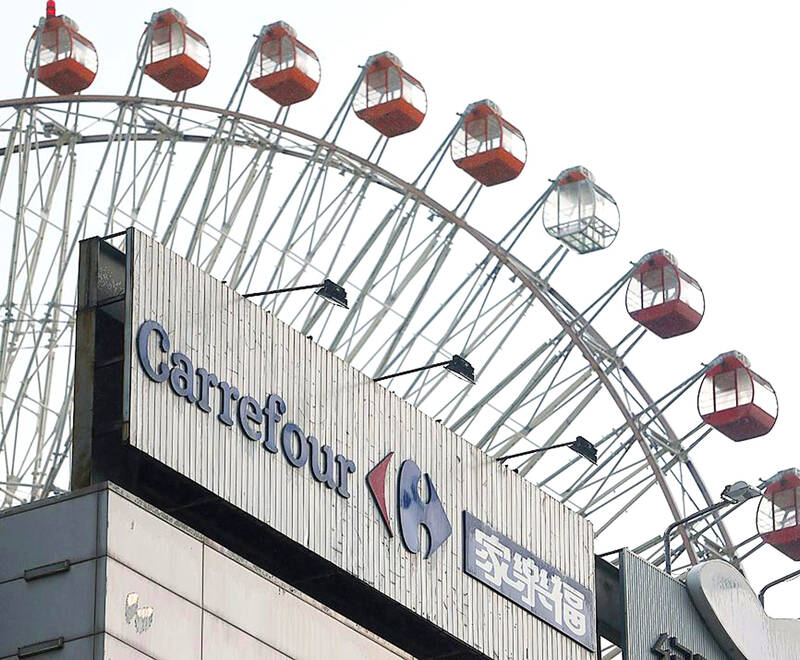Carrefour Taiwan is planning to raise wages for full-time entry-level employees by 10 percent on average starting from next month in a bid to retain workers amid a labor shortage in the local service sector, the hypermarket brand said on Wednesday.
In addition, Carrefour said it would introduce other incentives, such as a bonus equivalent to half-a-month’s salary for full-time entry-level employees and a more than 3 percent wage hike based on job performance later next year.
The company has a sound performance evaluation mechanism in place to protect employees’ interests, it said.

Photo: CNA
The hypermarket operator said it would provide better compensation than the Ministry of Labor has regulated to meet market standards, and boost welfare and benefits for employees, referring to the government’s latest minimum wage hike of 4.05 percent for next year.
The company plans to spend several hundred millions of New Taiwan dollars on wage hikes and bonuses next year, it said.
It said the increase in compensation represents an effort to make the company the top choice for those interested in joining the local retail sector.
The wage hikes were planned even though Carrefour still incurred a loss of NT$1 billion (US$31.92 million) in the first nine months of this year.
Uni-President Group (統一集團) chairman Alex Lo (羅智先) last month said the new management would try to ensure the hypermarket chain improves its bottom line. Uni-President Group completed its acquisition of a 49.5 percent stake in Carrefour Taiwan earlier this year to bring the retailer fully under the group’s corporate umbrella.
Similar to Carrefour, PX Mart Co (全聯實業), one of the leading supermarket chains in the country, said it would continue its annual wage hike program by raising employee salaries by about 4 percent on average to tackle the ongoing labor shortage.
PX Mart said there are a total of 350 store managers who would receive NT$1 million in annual salary under the annual wage hike program.
Speaking with reporters, PX Mart president Tony Tsai (蔡篤昌) on Tuesday said that the staff shortage at the supermarket chain’s stores is currently about 20 percent, adding that the retailer has introduced an automated billing system in some of its stores to ease the impact of the labor shortage.

Taiwan Semiconductor Manufacturing Co (TSMC, 台積電) yesterday said that its investment plan in Arizona is going according to schedule, following a local media report claiming that the company is planning to break ground on its third wafer fab in the US in June. In a statement, TSMC said it does not comment on market speculation, but that its investments in Arizona are proceeding well. TSMC is investing more than US$65 billion in Arizona to build three advanced wafer fabs. The first one has started production using the 4-nanometer (nm) process, while the second one would start mass production using the

When an apartment comes up for rent in Germany’s big cities, hundreds of prospective tenants often queue down the street to view it, but the acute shortage of affordable housing is getting scant attention ahead of today’s snap general election. “Housing is one of the main problems for people, but nobody talks about it, nobody takes it seriously,” said Andreas Ibel, president of Build Europe, an association representing housing developers. Migration and the sluggish economy top the list of voters’ concerns, but analysts say housing policy fails to break through as returns on investment take time to register, making the

‘SILVER LINING’: Although the news caused TSMC to fall on the local market, an analyst said that as tariffs are not set to go into effect until April, there is still time for negotiations US President Donald Trump on Tuesday said that he would likely impose tariffs on semiconductor, automobile and pharmaceutical imports of about 25 percent, with an announcement coming as soon as April 2 in a move that would represent a dramatic widening of the US leader’s trade war. “I probably will tell you that on April 2, but it’ll be in the neighborhood of 25 percent,” Trump told reporters at his Mar-a-Lago club when asked about his plan for auto tariffs. Asked about similar levies on pharmaceutical drugs and semiconductors, the president said that “it’ll be 25 percent and higher, and it’ll

CHIP BOOM: Revenue for the semiconductor industry is set to reach US$1 trillion by 2032, opening up opportunities for the chip pacakging and testing company, it said ASE Technology Holding Co (日月光投控), the world’s largest provider of outsourced semiconductor assembly and test (OSAT) services, yesterday launched a new advanced manufacturing facility in Penang, Malaysia, aiming to meet growing demand for emerging technologies such as generative artificial intelligence (AI) applications. The US$300 million facility is a critical step in expanding ASE’s global footprint, offering an alternative for customers from the US, Europe, Japan, South Korea and China to assemble and test chips outside of Taiwan amid efforts to diversify supply chains. The plant, the company’s fifth in Malaysia, is part of a strategic expansion plan that would more than triple